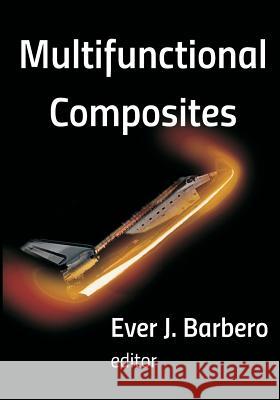Multifunctional Composites » książka
Multifunctional Composites
ISBN-13: 9781516804528 / Angielski / Miękka / 2015 / 450 str.
Multifunctional composites include all composites which provide more than one property, or functionality, whether specifically designed or modified from existing designs. Although traditional polymer matrix composites have many useful properties including stiffness, strength, and durability, these often involve tradeoffs such as poor acoustic damping and low electrical conductivity. By designing multifunctional composites, new and enhanced functionalities can complement the typical high-stiffness and high-strength densities of composites. Furthermore, multifunctional composites can feature entirely original functionalities, such as self-healing and microvascular transport, which do not exist in classical composites. Among the shortcomings of traditional composites are lower conductivity and higher contact resistance than aluminum. This complicates efforts to provide aircraft with shielding, grounding, and protection from lighting strikes. Laminated composites are also susceptible to damage when subjected to low velocity impact, resulting in reduced compression-after-impact (CAI) strength. In applications such as aircraft, rotorcraft, windmills, and missiles, erosion by rain and sand roughens surfaces of classical composites, reducing aerodynamic performance and optical and radiation transmission. In addition, traditional composites' high stiffness-to-weight ratio facilitates the propagation of acoustic and mechanical vibration, leading to passenger discomfort and even mechanical damage. Innovative materials that can mitigate these shortcomings are thoroughly described in this book-from design to application. Learn how self-healing composites can remedy many types of damage, including intralaminar cracking, delaminations, erosion, and damage to anti-corrosion coatings. Read about composites endowed with microvascular transport, which can deliver healing agents, coolants, or refrigerant fluids throughout the material. Find out about developments in nanotechnology resulting in lower gas permeability, improving storage tanks, food packaging, fire resistance, and thermal protection systems. Furthermore, discover composites with innovative excitation-response capabilities that are not found in nature. CONTRIBUTORS Chapter 1 Electromagnetic effects Ernest K. Condon III and Paul J. Jonas Wichita State University, National Institute for Aviation Research, Wichita, KS, USA Chapter 2 Lightning strike protection systems Gasser F. Abdelal Queen's University Belfast, Belfast, UK Chapter 3 Toughening for impact damage Timothy L. Norman Cedarville University, Cedarville, Ohio USA, and C. T. Sun Purdue University, West Lafayette, IN, USA Chapter 4 Erosion resistance Edmond Tobin, Aidan Cloonan, and Trevor Young University of Limerik, Republic of Ireland Chapter 5 Acoustic and vibration damping Edith R. Fotsing, Annie Ross, and Edu Ruiz Ecole Polytechnique de Montreal, Montreal, Canada Chapter 6 Viscoelastic damping treatments R.A.S. Moreira University of Aveiro, Aveiro, Portugal Chapter 7 Self-healing in polymers and structural composites Kathryn Mireles and Micheal R. Kessler Washington State University, Pullman, WA, USA Chapter 8 Microvascular transport Christopher J. Hansen University of Massachusetts Lowell, Lowell, MA, USA Chapter 9 Permeation Shaokai Wang Beihang University, Beijing, China, and Ayou Hao Florida State University, Tallahassee, FL, USA Chapter 10 Fire safety Ning Tian University of Ulster, Newtownabbey Co, Antrim, UK, and Aixi Zhou University of North Carolina at Charlotte, Charlotte, NC, USA Chapter 11 Thermal protection systems Maurizio Natali, Luigi Torre, and Jose Maria Kenny University of Perugia, Perugia, Italy Chapter 12 Magnetoelectric composites Tomas I. Muchenik and Ever J. Barbero West Virginia University, Morgantown, WV, USA LOOK INSIDE at http: //barbero.cadec-online.com/Multifunctional
Zawartość książki może nie spełniać oczekiwań – reklamacje nie obejmują treści, która mogła nie być redakcyjnie ani merytorycznie opracowana.











